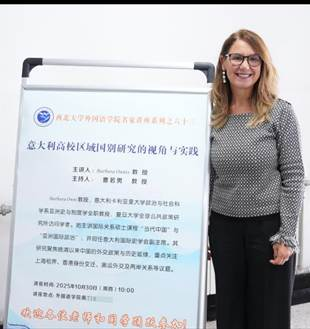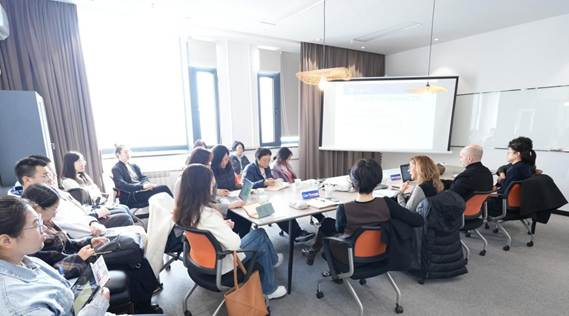On the morning of October 30, 2025, Professor Barbara Onnis from the Department of Political and Social Sciences at the University of Cagliari, Italy, visited our School upon invitation and delivered an academic lecture titled “Perspectives and Practices of Country and Region Studies in Italian Universities.” The lecture was chaired by Professor Cao Ruonan, Dean of our School, and attended by Professor Matteo Cappasso from the School of Country and Region Studies at Northwest University, along with faculty and students from our School, creating a rich academic atmosphere.

In her opening remarks, Dean Cao Ruonan warmly welcomed Professor Onnis and briefly introduced her academic background. Professor Onnis began with her personal experiences, fondly recalling her over thirty-year engagement with Chinese studies. Since the 1990s, she systematically studied Chinese language and conducted research at Tianjin Foreign Studies University and Fudan University. Through language proficiency, she delved into Chinese history, culture, and social changes, particularly emphasizing how modern China’s developmental achievements provide vivid case studies and theoretical insights for Country and Region Studies.

During the lecture, Professor Onnis highlighted the practical experience of the University of Cagliari (UniCa) in Country and Region Studies. She emphasized that the university consistently adheres to the core philosophy of “moving beyond Eurocentrism” in its research, constructing an intercultural, long-term analytical framework. She argued that Country and Region Studies should integrate a global perspective, employing multidimensional research methods such as language learning, reading primary texts, and field investigations. This approach places national conditions within the framework of global history, paying attention to long-term historical context. Citing Edward Said’s theory of “Orientalism,” Professor Onnis pointed out that traditional Western perspectives often regard Asia as an “exotic other,” overlooking its internal developmental dynamics. Professor Onnis addressed the influence of Eurocentrism on Asian studies, reflected on the limitations of Western historical perspectives, and stressed the importance of critical thinking to “challenge stereotypes.” Finally, Professor Onnis concluded that the key to Country and Region Studies lies in the “close integration of language, culture, and history.” Researchers must fully engage in field investigations, avoiding reliance solely on documents— “armchair scholarship”—to truly understand the internal logic of different civilizations.
In his commentary, Professor Matteo Cappasso of Northwest University highly praised the lecture, noting that it profoundly revealed the core principles of Country and Region Studies, with the “de-Eurocentrism” perspective offering significant insights for current international academic cooperation. He pointed out that as China’s international influence grows, global academia is paying increasing attention to Chinese research perspectives, and the Chinese modernization process provides an important reference for Country and Region Studies.
At the end of the lecture, faculty members engaged in in-depth discussions with Professor Onnis on topics such as “methodologies for cross-cultural research” and “the integration of Chinese and Western historical perspectives.” This event not only provided our faculty and students with exposure to internationally advanced experiences in Country and Region education but also promoted the collision and mutual learning of Chinese and foreign academic ideas, holding positive significance for the discipline construction and talent cultivation in our School.
